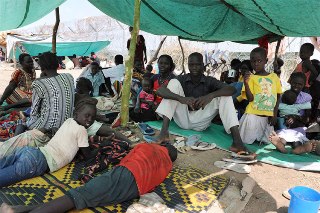Sudan submits rebuttal to UN Security Council over S. Kordofan abuses
August 18, 2011 (KHARTOUM) – Sudan has submitted a rebuttal to the United Nations detailing its objections to a human rights report, which alleges that war crimes and crimes against humanity may have been carried out in South Kordofan, a key oil state bordering newly independent South Sudan.

On Monday a report from the UN’s Higher Commission for Human Rights said that abuses allegedly committed in South Kordofan may amount to “war crimes” and “crimes against humanity,” and must be fully investigated.
Sudan’s Permanent Representative to the UN, Ambassador Dafalla Al-Haj, told Sudan’s official news agency (SUNA) on Thursday that the damning report was not credible and was based on hearsay.
Khartoum reacted angrily when the report was published on Tuesday with foreign ministry spokesman, Al-Obaid Marawih, describing its contents as “biased and predicated on no evidence.” He told SUNA that the new UN report was a “repetition” of a report leaked to the media in July, which was authored by the recently defunct UN Mission in Sudan (UNMIS).
UNMIS’s mandate expired on 9 July, with the independence of South Sudan – the last day of the Comprehensive Peace Agreement signed by Khartoum and former southern rebels the SPLA.
But South Sudan’s independence was in some ways overshadowed by the outbreak of fighting in South Kordofan between the SPLA-N and the Sudan Armed Forces (SAF) five weeks earlier.
Fighters from the Nuba Mountains in South Kordofan joined the South Sudan-based SPLA in their two decade conflict with Khartoum. However, after South Sudan’s succession the largely SPLA-aligned Nuba and other groups remain in North Sudan being governed by National Congress Party (NCP) in Khartoum.
Before the conflict erupted in early June the situation in the area was already tense after the SPLA’s political wing – the SPLM – lost state elections to the NCP in early May. The SPLM-N say that fighting began when Sudan’s military attempted to disarm them on June 3. Khartoum, however, blame the “rebels” for starting the fighting by overrunning an police station in Kadugli the state capital.
The fighting quickly escalated into heavy aerial bombardment by Khartoum amid reports of attacks targeting the state’s African indigenous Nuba population.
A UN official last week said that at least 200,000 people in South Kordofan have been killed, injured or forced to flee their homes and land since the fighting erupted.
Entitled “Preliminary report on violations of international human rights and humanitarian law in Southern Kordofan from 5 to 30 June 2011”, the new report underscored the gravity of the acts committed by Sudan’s army and its allied paramilitary forces in the region.
According to the report, “serious” violations of human rights law were committed in South Kordofan, including enforced disappearances aerial bombardments; forced displacement; abductions; house-to-house searches; arbitrary arrests and detentions; targeted killings and summary executions.
“If substantiated [the actions] could amount to crimes against humanity, or war crimes for which individual criminal responsibility may be sought,” the report said.
June’s leaked UNMIS report observed “especially egregious” conduct by Sudan’s army and one of its allied paramilitary groups – the Popular Defense Forces – saying they “have targeted members and supporters of the SPLM/A, most of whom are Nubans and other dark skinned people.”
The US, a permanent member of the United Nations Security Council, has called for the reports recommendation of an investigation into the conduct of Sudan’s army and the SPLA during the conflict to be implemented.
Susan Rice, the US ambassador to the UN urged all members of the Security Council to join them “in pressing for implementation of these recommendations”.
However, it is unclear whether any action will be taken, considering that Russia and China, traditional allies of Sudan, are permanent members of the council and only last week quashed US efforts to condemn the action of Sudan’s military in South Kordofan.
The UNMIS report recommended that the International Criminal Court (ICC) could be the appropriate body to investigate whether war crimes have been committed or humanitarian law has been broken in South Kordofan.
At the behest of the Security Council the ICC has already investigated the conduct of Sudan’s counter-insurgency campaign in the country’s restive region of Darfur. This resulted in indictments in 2007 for Sudan’s president and the now governor of South Kordofan, who was at the time minister for interior. Both were charged with war crimes and crimes against humanity, while President Omar Hassan al-Bashir was further charged with genocide by the Hague-based court in 2009.
Sudan responded to the recommendations of the report, not only by dismissing it as as “unfounded” and “malicious”, but also by announcing the creation of its own fact finding committee to assess the human rights situation and international humanitarian law in the state.
Ambassador Al-Haj told SUNA that he had petitioned the current chair of the Security Council and all its members to await the results of Sudan’s own investigation before the issue of South Kordofan is discussed. He also complained about the fact that Sudan would not be able to sit in on the closed meeting.
(ST)
